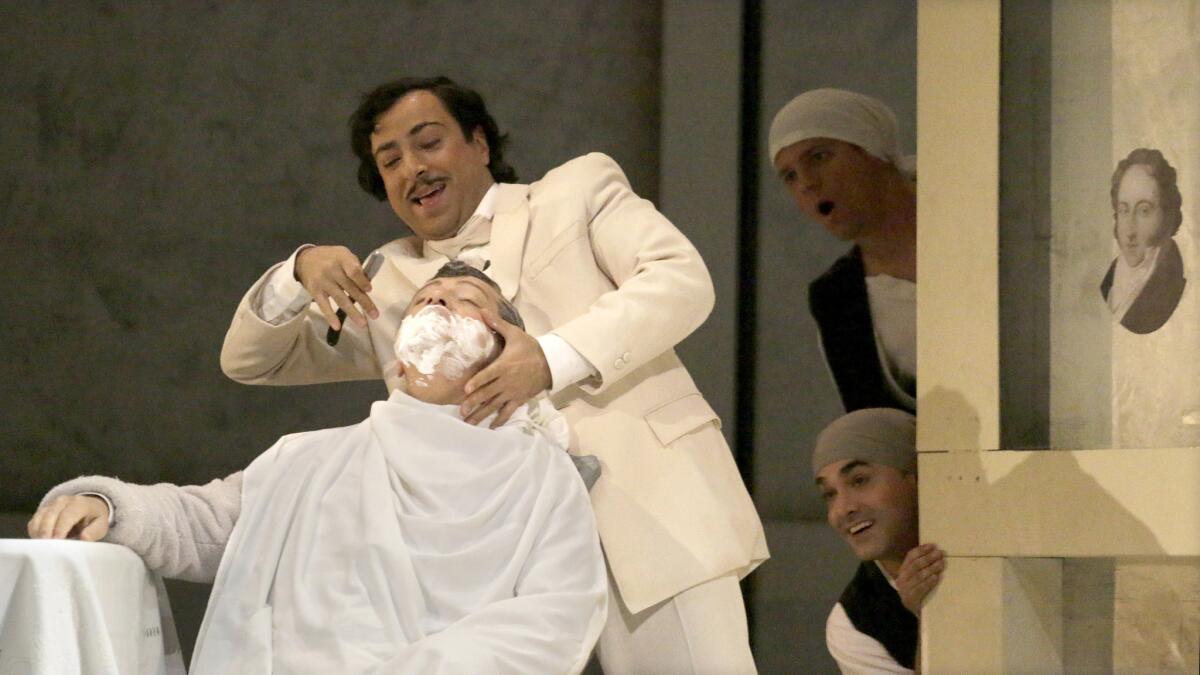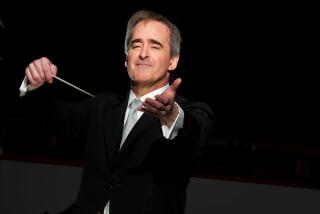Review: Singing best part of L.A. Opera’s slapsticky ‘Barber of Seville’

I have not seen so happy an audience at Los Angeles Opera this season as the crowd in the Dorothy Chandler Pavilion on Saturday night. The company revived its slapstick 2009 production of Rossini’s “The Barber of Seville,” and the young people sitting behind me laughed uproariously at every comic line in the libretto and every dumb visual joke.
They weren’t alone. From my seat, the performance felt like the taping of a TV sitcom laugh track. Surely, this is good news for L.A. Opera.
I was not among those amused. I like my slapstick less predictable and more inventive than Spanish director Emilio Sagi’s comic book send-ups of Doctor Bartolo as the doddering old slob scheming to marry his pretty, innocent ward, Rosina, or of Figaro as a likably sleazy hustler.
ESSENTIAL ARTS & CULTURE NEWSLETTER >> Get great stories delivered to your inbox
But humor is personal, so let’s talk about singing. Most of the cast is familiar. The news is Elizabeth DeShong, making her L.A. Opera debut as Rosina.
The young mezzo-soprano from Pennsylvania attracted attention two years ago when she was a soloist in a Bach cantata that Gustavo Dudamel conducted with the Los Angeles Philharmonic. She has since won raves for her Rossini in Vienna and London.
She’s clearly earned them for her combination of autumnal richness and easy flexibility. That she was a perky but plain Rosina in this “Barber” may be more Sagi than DeShong (or Trevore Ross, who is directing this revival of the original production). DeShong certainly wasn’t helped by Renata Schussheim’s polka-dot costumes or black wig.
But when everything stopped for an aria, you could almost forget all that, were she not throwing kisses or whatever. Perhaps she could motivate L.A. Opera to tackle one of Rossini’s more serious operas, great works mostly neglected elsewhere and completely neglected here.
Tenor René Barbera’s effortless vocal grace makes him suitable for bringing some class to Count Almaviva, but not in those clothes and particularly not in the frilly pink number at the end. Rodion Pogossov’s Figaro might have had the charm of a Sammy Davis Jr. had he been able to lose the mustache or smarmy polka-dot vest.
Doctor Bartolo was made to look like a mean, bumbling bumblebee. That he became sympathetic at the end is a tribute to veteran baritone Alessandro Corbelli and to Rossini. Kristinn Sigmundsson’s towering Don Basilio and deep bass provided a welcome hint of actual threat to the scheming music teacher.
Sagi’s greatest interest seemed to be with the servants in the background, particularly with their behind-the-scenes derisions. This is where he came closest to giving this opera, which L.A. Opera is presenting as part of its “Figaro Unbound” festival, a little social context. Lucy Schaufer’s Berta, the old servant who wasn’t so old here, turned out to be the lustiest and most real character onstage.
James Conlon conducted as though he may have agreed with me about the production’s use of humor. He emphasized little of Sagi’s silliness, letting it speak or not for itself, yet taking care to keep Rossini’s tricky ensembles musically sure.
His unusually suave approach was to take the lyric high road, conducting with a grand sweep while lovingly bringing out inner details in the orchestra. Most important of all, he sensitively supported and guided DeShong, bringing out all that is special about her. Conlon saves the show.
Twitter: @markswed
More to Read
The biggest entertainment stories
Get our big stories about Hollywood, film, television, music, arts, culture and more right in your inbox as soon as they publish.
You may occasionally receive promotional content from the Los Angeles Times.







